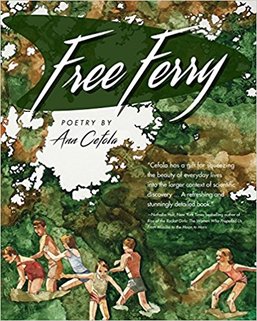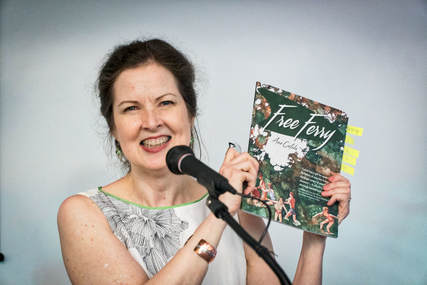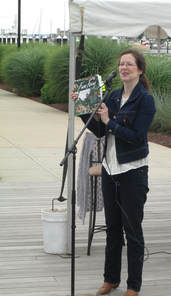 Ann Cefola at the Poet's Corner at the Stamford Arts Festival. Ann Cefola at the Poet's Corner at the Stamford Arts Festival. Over the summer, I did two poetry readings organized by the talented writer Jerry T. Johnson. At the Arts Festival in Stamford, I met fellow poet Ann Cefola. Although we didn't have a lot of time to talk in person, she was quite lovely to chat with, and a very accomplished poet, with several collections of poetry and notable achievements in the field. Her official bio: Ann Cefola is author of Free Ferry, (Upper Hand Press, 2017); Face Painting in the Dark (Dos Madres Press, 2014), St. Agnes, Pink-Slipped (Kattywompus Press, 2011), Sugaring (Dancing Girl Press, 2007), and the translation Hence this cradle (Seismicity Editions, 2007). A Witter Bynner Poetry Translation Residency recipient, she also received the Robert Penn Warren Award judged by John Ashbery. Her work appears in journals such as Feminist Studies and Natural Bridge, and translations in Eleven-Eleven, Exchanges, and Inventory among others. I recently reviewed her latest poetry collection, Free Ferry. The book review will be coming out in November at Bewildering Stories. She was also kind enough to agree to answer a few questions about her work, her writing, and the art of translating poetry from one language to another.
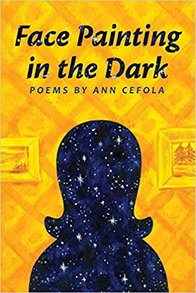 I love the idea of poetry being a language all by itself - and you being fluent in it from an early age. Referring to languages, I also see that you've done a translation of Hélène Sanguinetti's poetry from French to English. While your published poems are in English, have you ever written poetry in a different language or had your poems translated to another language? If so, how does language affect your style? If not, do you think you ever would? Poetry feels an act of translation--so I probably would not attempt to write in another language beyond English. But--funny you should mention--a dear friend, Ligia Yamazaki, is translating my first book, Face Painting the Dark, into Spanish. When I wrote the long poem, "Demoiselles 7," I tapped into the voice and intonation of Ligia, a native Colombian, as I invited the female figures in Picasso's "Demoiselles d'Avignon" to speak. So the poem had a Latin feel to it, but now, in Spanish, it is over-the-top beautiful, like the poem has found its true home. 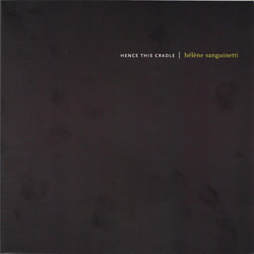 That sounds really lovely, especially being able to work with your friend to bring about your vision of your work. Since you've been on both sides of the equation, what's entailed in translating poetry from one language to another? How closely do you work with your counterpart? The first step is getting the meaning down, and then crafting it to reflect the writer's intention as closely as possible. When I first met Hélène, she said, "Do whatever you want." And I replied, "You can't steal my words--I want to follow yours as closely as possible!" She only protests when I might smooth the sharp edges that make her work so compelling. Although we are in frequent contact about publishers interested in her poetry, I work on my own. As a translator of French poetry, the many references to Greek mythology in Free Ferry, and mention in the previous question of your poem taking on the voice of the Colombian native, Ligia, your work certainly has international themes. I might hazard a guess that you've traveled a fair amount. If you're comfortable doing so, could you tell us a little bit about your background - such as where you grew up, the languages you speak, and maybe where you've enjoyed traveling? 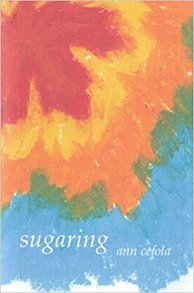 I grew up in the New York suburbs. After studying French and Spanish in college, I found work with French companies. During those years, I traveled to France and Italy. After I started my own communications business, my focus was on my New York area clients--several Fortune 10 companies. Travel took a backseat, and today I would certainly love to catch up on it. A review I did of your book Free Ferry will be coming out at the magazine Bewildering Stories in November. I really enjoyed the dichotomy between childhood and the adult world, between scientific accomplishment and everyday family events. Although there is some thematic overlap, what spurred the ideas between this exploration of concepts that are presented as opposing, to the point that even the poems are separated by the length of the page (the everyday poems are at the top of the page, the scientific poems at the bottom)? And is there a significance to having the everyday-themed poems visually elevated above the scientifically-themed poems? I am glad you enjoyed it! The first chemical synthesis and weighing of plutonium on September 10, 1942 changed the world. The bottom narrative follows the story of one participating scientist. As shown in the top more everyday poems, two decades later people lived their ordinary lives. Yet, for the first time in history, we had this sense that we could destroy ourselves--which was a new awareness and constant "undercurrent." I wanted to represent that visually and see if the two narratives might resonate with one another in surprising ways. What would you say are some other themes you explore in your poetry, both in Free Ferry and also in your work as a whole? For example, the integration of mythological figures like Eurydice and Orpheus in Free Ferry. Who do they represent, and what are their roles as reoccurring characters in this work? The opening poem, [orrery], references a time when I discovered my mother trying to sing "The Girl from Ipanema" in our basement. To see my mother, a typical housewife, attempting to sing blew my five-year-old mind. I see it as a metaphor for women having to go "underground" with their talents while they fulfilled their maternal roles. Parents are also bigger than life to their children, and in that sense, godlike. Additionally, my mother had an unusual invented first name and I wanted to capture the odd if antique sound with "Eurydice". My father played guitar and was a natural artist, so "Orpheus" seemed perfect. The myth of Eurydice conveniently resonated with the era--the subtle female oppression and underground shelters many families had. I love the imagery inherent in your poetry, and I think the interplay of women's different roles really comes through strongly. In many ways, women today face different situations than women decades ago, but there's still a struggle taking place in the search for equality in many societies, including our own. While Free Ferry addresses situations and ethos from the past, how do you feel it speaks to the political and social concerns of today's audience? Thank you, Alison. Everyone is saying the book strongly resonates with today's global environment. We're more aware these days that humankind has the opportunity to destroy itself and that decision may be out of our individual hands. And while many of us have access to goods and technologies our ancestors would envy, they can easily become a source of oppression and sometimes enslavement. As far as women's rights go, you would have to tell me how it is for you as a young mother--where do you feel any societal pressure to be or live a certain way? I definitely agree there is an unfortunate similarity today to what was faced decades ago in the political sphere, and that message comes through quite effectively in the narrative of your work. Similar to the feminist issues addressed - although as a stay-at-home mom myself, I sometimes feel a bit anachronistic in today's world. :) In the 1960s, the era of my narrative poems in Free Ferry, suburban mothers who worked outside the home were judged harshly for doing so. Then, after the second wave feminism, women who were stay-at-home mothers in the 80s were equally criticized. I hope, at this point, a stay-at-home mom is seen as someone who is lucky to have--and exercise--that option. As one writer to another, I always like to ask about the creative process. How do you know a poem or a body of work is finished? A writer friend of mine says he never stops editing his poetry, even after publication. To him, writing is fluid; like an oral story, it changes each time it's told. Are you ever drawn back to motifs from earlier writing? Do you ever revisit published work? Or is your approach similar to how I view it - when it's done and published, it's time to look towards a new project? When I've done my best with a poem, and it achieves what I want it to, I am done. It's like a door closing with a good click. There's no more to do; if I want better, I take that awareness into my next work. The times I attempted to change a poem from the past felt like trampling on the writer I was then--the skill set and intentions I possessed at that time. It felt like a trespass. The hardest thing to drop is translation. That always seems fluid, and for that I have to exercise self-discipline and say, "This is done. These are the decisions I have made." Saying something different or better in translation is always an inviting vortex. And in translating work, it's probably harder because you're working with another person's words, as well as another language. It seems to invite more possibilities for variation. It's a great exercise in expanding one's vocabulary and consideration of nuance--like an addictive game of Scrabble. So what's coming up next for you? Are there any new collections or translations you're working on, or poems on their journey towards publication? I have two collections in mind at this point, and Hélène just published Domaine des englués (La Lettre Volée) so I will be translating that. I have Free Ferry readings at Fordham on October 11, CUNY on October 18, and will join our Stamford Arts Festival friends at the Gordon Fine Arts Gallery on November 18. Thanks so much for chatting with me, Ann! I look forward to reading more of your writing. It was great to talk with you. If you'd like to catch up with Ann in person and listen to her poetry live, here's a list of where she'll be doing readings in the upcoming months:
Wednesday, October 11, 2:30pm-5:30pm (Free) Fordham University, Rose Hill Campus, Flom Auditorium in Walsh Library Wednesday, October 18, 4:00pm-5:30pm (Free) City University of New York, Rifkind Center for Arts and Humanities, Rifkind Room in NA 6/316 Sunday, October 29, 1:30pm-3:30pm ($10 Admission) JCC on the Hudson, Matters of the Heart Reading with Local Poets Thursday, November 2, 7:00pm-8:30pm (Free) Norwalk Public Library, Poets in Conversation with Laurel Petersen Thursday, November 16, 6:45pm-8:15pm (Free) Purchase College, Reading and discussion for the course "Modernism, Media and the Middle Class"
4 Comments
Jeanne
10/3/2017 07:28:25 am
Loved this interview. You're such a good listener and your questions reflect this! Thanks it was a fun read.
Reply
10/4/2017 10:35:32 am
Thanks, Jeanne! Ann's poetry is very thought-provoking, and it was really great to be able to talk with her. Glad you enjoyed the interview!
Reply
Leave a Reply. |
Who the heck is Alison McBain?I am a freelance writer and poet with over two hundred short pieces published in magazines and anthologies. Check out my 2024 writing challenge to write a book a week at Author Versus AI. For more info, please check out my "About Me" page. © Alison McBain. All rights reserved
Archives
July 2024
|


